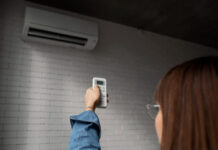Summer is finally here, and homeowners all across the nation have started to rely on their air conditioning units to keep them cool. However, as much as we love our ACs, they can sometimes disappoint us by breaking down or performing poorly. In this article, we’ll explore six of the most common air conditioning issues that homeowners experience and what may be causing them.
Poor Airflow
Poor airflow from your AC can be caused by a blocked or dirty air filter. Over time, air filters can become clogged with dust and debris, reducing the amount of air moving through your system. A dirty air filter can also lead to compressor failure or frozen coils. It’s advised to change your air filter regularly, at least once a month, or according to your manufacturer’s recommendations.
Refrigerant Leaks
Refrigerant is an essential component of your air conditioning system. It is what allows the AC to cool the air in your home. Over time, tiny leaks can develop in the refrigerant lines due to wear and tear on the refrigerant lines. This is especially true if they are not installed properly or are old and outdated. They can cause the pressure and temperature of the refrigerant to drop. This can lead to your AC blowing out warm air. If you suspect a refrigerant leak, it’s important to contact an HVAC professional to fix it. Refrigerant is hazardous and attempting a repair yourself can cause you harm.
Dirty Evaporator or Condenser Coils
Your AC’s evaporator and condenser coils help with heat transfer. However, sometimes these coils can become dirty and covered in grime if not maintained. This, in turn, reduces heat transfer, making your AC work harder and longer to cool your home. An overworked AC unit can burn out faster and cause it to break entirely. Scheduling regular maintenance with an HVAC professional to safely clean your coils and prevent damage to your unit can help to prevent this issue.
Thermostat Issues
Your thermostat is the brain of your HVAC system, and an old or faulty thermostat can cause issues. The device measures the temperature in your home and regulates the temperature of your air conditioning system accordingly. There are two types of thermostats: manual and programmable. Manual thermostats must be manually adjusted to turn on or off the cooling system at any time while programmable thermostats can be programmed to turn on and off at predetermined times. If your thermostat is not working correctly, your AC might not turn on at all, turn on and off frequently, or blow out too warm/cold air. You can check that your thermostat is working correctly by replacing the batteries regularly and conducting a manual test. If you suspect that there’s a malfunction, consider upgrading your thermostat.
Dirty Air Ducts
Over time, the ductwork in your home can accumulate dust, grime, and other debris. This buildup can restrict the airflow and reduce the efficiency of your air conditioning. It can also affect air quality, leading to allergies, asthma, and other respiratory problems. The best way to avoid this is simply to schedule regular duct cleaning with a professional to ensure that your ducts stay clean, and your AC works at peak performance.
Faulty Electrical Components
Your air conditioning unit has several electrical components, including capacitors, contactors, and fans. These components can wear out with use just like any other electrical device, potentially causing your system to shut down completely or overheat, and causing damage. If you hear strange noises, notice that your AC isn’t running consistently, or your fan isn’t working, it’s a sign you should call for air conditioning repair. A professional can help diagnose and fix the issue without risking any more damage to the unit.
Your air conditioning system is an essential part of your home during the summer. These AC issues can be resolved by regular maintenance of your unit, as well as prompt repairs by certified HVAC professionals. Stay cool this summer and keep your AC in optimal condition by knowing how to take care of your system and solving these common issues. Remember to change your air filter regularly, clean your coils, schedule air duct cleaning, upgrade your thermostat if needed, fix all the refrigerant leaks, and swiftly repair any electrical issue.















